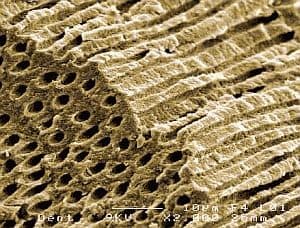Believe it or don’t, but the idea that sugar causes cavities? Not exactly true.
So why are dentists so down on the stuff? Because it’s the favorite food of the pathogenic microbes that cause tooth decay and gum disease, and as they say, what goes in must come out. In this case, what comes out is so acidic, it can wreck the strongest tissue in your body, tooth enamel – which also happens to be the only tissue your body can’t make more of. Once it’s gone, it’s gone.
 Fortunately, your teeth have a way of protecting themselves – courtesy of the flow of fluid inside those miles of microscopic tubules we told you about last time.
Fortunately, your teeth have a way of protecting themselves – courtesy of the flow of fluid inside those miles of microscopic tubules we told you about last time.
The fluid within those dentinal tubules is mostly cytoplasm that’s passed through the membranes of odontoblasts: special cells that form part of the inner pulp of a tooth and create new dentin around it. Under normal, healthy conditions, this dentinal fluid flows in an outward direction, from the pulp, through the dentin, toward and through the enamel. (Though it looks solid, enamel is actually porous.)
As Dr. Ralph Steinman demonstrated at Loma Linda University more than four decades ago, this has a few important implications when it comes to dental health:
- Since dentin has no direct blood source, the outward flow draws nutrients from blood vessels in the pulp into the dentin, keeping it healthy.
- The outward flow repels acids and microbes, keeping them from penetrating the tooth.
- The fluid, being alkaline, helps neutralize acids generated by the microbes.
So if teeth are protected, why do they become vulnerable to decay? Because sometimes, the flow can actually reverse course or otherwise be disrupted. When dentinal fluid flows inward, toward the pulp, it draws acids and pathogens into the tooth, as well.
Factors that can reverse or disrupt the flow include high intake of sugars and simple carbs, inactivity, chronic stress, pharmaceutical drug use and malnutrition (not getting enough vitamins, minerals and other necessary micronutrients).
Suffice it to say, healthful eating and an active, balanced lifestyle are among the best things you can do to make sure your teeth can take care of themselves as they were designed to do. (The others, of course, are regular flossing and brushing.)
Nutritionally, you want to be sure to get plenty of calcium, phosphorous and vitamin D, all of which help remineralize your teeth, keeping them strong and solid. Also, a healthy intake of antioxidants may reduce inflammation, which subsequent research has shown capable of interfering with good hypothalamus function – the gland Dr. Steinman and his colleague Dr. John Leonora found to control the parotid (main salivary) gland that, in turn, guides the flow of dentinal fluid. (Of course, inflammation is also the common denominator of gum disease, heart disease, diabetes and other chronic illnesses.)
It all comes down to care of the body and care of the teeth. As Dr. Ken Southward wrote not long ago in General Dentistry,
The tooth is designed to withstand the harsh oral environment, provided it is properly nourished. A high-sucrose diet affects the tooth from the outside by enabling oral bacteria to produce acid and from the inside by reducing the dentinal fluid flow and the body’s ability to control the inflammatory process in the dentin…. Minimizing sucrose as well as increasing fruit and vegetable intake and nutritional supplementation are modifiable lifestyle decisions with significant measurable benefits.
Eat less sugar and more produce – again?!? Is that the advice for everything?!?
Just about…which is a very good sign of just how important those food choices are.
For a clear and solid summary of Steinman’s and Leonora’s research, see this article.
Image via healingteethnaturally.com